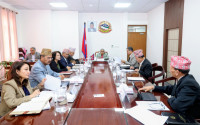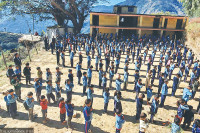National
Soaring costs are preventing Nepalis from having more kids
From cities to villages, rich to poor, the country’s fertility rate has dropped to two, new UNFPA study says.
Post Report
The rising cost of living in Nepal is discouraging couples from having as many children as they would like, a new report of the United Nations Population Fund says.
According to the findings of the UNFPA’s 2025 State of the World Population report titled “The Real Fertility Crisis: the Pursuit of Reproductive Agency in a Changing World,” many people in urbanised provinces such as Bagmati and Gandaki are having fewer children than they desire, despite a steady preference for two or more children. This has also reduced the country's total fertility rate, the report says.
“The average fertility rate in Nepal has declined to two children per woman, a trend that cuts across all social groups—urban and rural, educated and non-educated, high-income and low-income,” reads the report.
High living costs, insecure jobs, unaffordable housing and childcare, lack of a supportive partner, limited access to reproductive health care, and broader concerns about global crises like climate change and conflict are attributed to be reasons which have discouraged people from having as many children as they would like.
The report states that the mismatch between desired and actual family size is increasingly evident across provinces. This gap is particularly pronounced in areas where employment insecurity, spousal separation due to labour migration, lack of childcare, and housing costs are making parenthood a difficult choice.
“Globally, vast numbers of people are unable to create the families they want,” said Won Young Hong, UNFPA Representative in Nepal. “It is the case for Nepal as well. Some people are prevented from parenthood while others are forced into it. This is not about overpopulation or declining fertility—it is about expanding choices in an enabling environment for young men and women to have the family they envision. Paid family leave, affordable reproductive health care, childcare, and supportive partners are not luxuries. They are essential.”
In Nepal, urbanisation, job insecurity, rising costs, and lack of flexible work policies make it difficult for young couples to envision a secure future with children.
In provinces like Bagmati, data show lower-than-desired fertility, and in others, such as Madhesh, people often report having more children than they had planned—both indicators of limited reproductive agency, the report shows..
“We must shift from anxiety about fertility rates to empowering individual agency,” said Hanaa Singer-Hamdy, UN Resident Coordinator to Nepal. “People need economic security, rights-based policies, and freedom of choice, not coercive measures.”
The UNFPA warns that simplistic or coercive responses, such as fertility targets, cash incentives, or restrictions on reproductive rights, are ineffective and risk violating human rights. Instead, policies that support individual choice are more successful in enabling people to realise their family aspirations.
The study was carried out in 14 countries—including nations with both high and low fertility rates—shows that one in five people globally expect not to have the number of children they want.
More than 50 percent of respondents cited economic issues—including the cost of living, housing, and childcare—as barriers to parenthood globally.
Globally, 31 percent of people reported having fewer children than desired, while 12 percent said they had more than desired, according to the study.
Spousal separation due to labour migration and gendered norms around caregiving further complicate fertility choices. Forty-three percent of people globally over age 50 said they did not achieve their desired family size—a striking measure of unmet reproductive goals.
The UNFPA has called on governments, including Nepal’s, to expand access to affordable, high-quality reproductive health services, including fertility care, and invest in family-friendly policies, such as paid parental leave, flexible work, and affordable childcare.
The UN agency has also asked governments to tackle legal barriers that restrict access to contraception or reinforce gender-based discrimination, provide comprehensive sexuality education throughout the life course to build fertility awareness, challenge misinformation and create supportive environments where both women and men are empowered to parent without compromising their personal or professional lives.
These investments are essential as Nepal prepares to navigate a rapidly ageing population—projections show that one in five people will be over 60 by 2071.




 8.39°C Kathmandu
8.39°C Kathmandu













